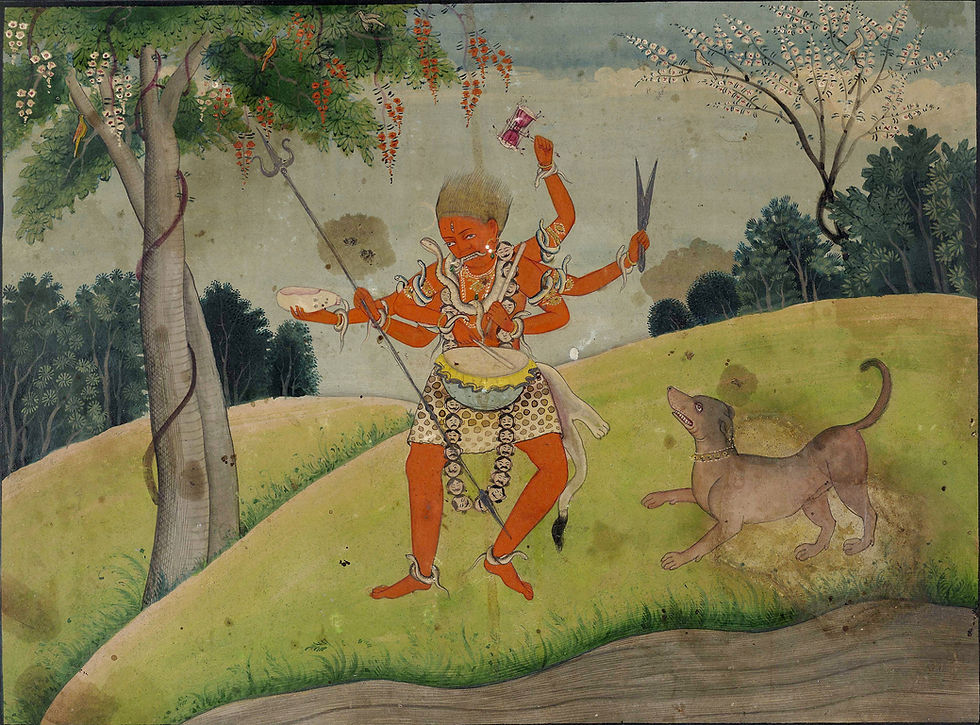Bhagya Sūktam — Invoking the Divine Fortune
- Rudranaad Foundation

- Oct 29
- 4 min read

Among the sacred hymns of the Rig Veda, the Bhagya Sūktam (भव्यसूक्तम्) stands as a sublime invocation to Bhaga, the deity who governs fortune, abundance, and divine grace. This Sūktam is a prayer for inner and outer prosperity — not merely material wealth, but the fullness of life, blessings of harmony, right companionship, nourishment, and success that arises from divine alignment.
Origin and Meaning
The Bhagya Sūktam appears in the Rig Veda, Mandala 7, Hymn 41, composed by Rishi Vasishtha.
It invokes Bhaga, alongside other deities like Mitra, Varuṇa, Aryaman, Indra, and the Ashvins, requesting their blessings for a life filled with auspiciousness, unity, and divine grace.
In essence, this Sūktam is a daily prayer for well-being, traditionally recited in the early morning hours to invoke the flow of fortune for the day ahead.
The Meaning and Essence
In Rātri Sūktam, the goddess is described as shining with stars, spreading her darkness like a cloak. She draws the daylight to its rest, allowing beings to retreat into calmness. She is the guardian of beings, restraining harm and ensuring safety through the stillness of night.
She represents the mystery of the unseen, the power of rest and withdrawal, and the sacred feminine that nourishes the cosmos by rhythm and balance.
Sanskrit
प्रा॒तर॒ग्निं प्रा॒तरिन्द्रग्ं॑ हवामहे प्रा॒तर्मि॒त्रावरु॑णा प्रा॒तर॒श्विना᳚ ।
प्रा॒तर्भगं॑ पू॒षणं॒ ब्रह्म॑ण॒स्पतिं॑ प्रा॒तस्सोम॑मु॒त रु॒द्रग्ं हु॑वेम ॥ १ ॥
प्रा॒त॒र्जितं॒ भग॑मु॒ग्रग्ं हु॑वेम व॒यं पु॒त्रमदि॑ते॒र्यो वि॑ध॒र्ता ।
आ॒द्ध्रश्चि॒द्यं मन्य॑मानस्तु॒रश्चि॒द्राजा॑ चि॒द्यं भगं॑ भ॒क्षीत्याह॑ ॥ २ ॥
भग॒ प्रणे॑त॒र्भग॒ सत्य॑राधो॒ भगे॒मां धिय॒मुद॑व॒ दद॑न्नः ।
भग॒ प्रणो॑ जनय॒ गोभि॒रश्वै॒र्भग॒ प्रनृभि॑र्नृ॒वन्त॑स्स्याम ॥ ३ ॥
उ॒तेदानीं॒ भग॑वन्तस्स्यामो॒त प्रपि॒त्व उ॒त मध्ये॒ अह्ना᳚म् ।
उ॒तोदि॑ता मघव॒न्थ्सूर्य॑स्य व॒यं दे॒वानाग्ं॑ सुम॒तौ स्या॑म ॥ ४ ॥
भग॑ ए॒व भग॑वाग्ं अस्तु देवा॒स्तेन॑ व॒यं भग॑वन्तस्स्याम ।
तं त्वा॑ भग॒ सर्व॒ इज्जो॑हवीमि॒ स नो॑ भग पुर ए॒ता भ॑वे॒ह ॥ ५ ॥
सम॑ध्व॒रायो॒षसो॑ नमन्त दधि॒क्रावे॑व॒ शुच॑ये प॒दाय॑ ।
अ॒र्वा॒ची॒नं व॑सु॒विदं॒ भगं॑ नो॒ रथ॑मि॒वाऽश्वा॑ वा॒जिन॒ आव॑हन्तु ॥ ६ ॥
अश्वा॑वती॒र्गोम॑तीर्न उ॒षासो॑ वी॒रव॑ती॒स्सद॑मुच्छन्तु भ॒द्राः ।
घृ॒तं दुहा॑ना वि॒श्वत॒: प्रपी॑ना यू॒यं पा॑त स्व॒स्तिभि॒स्सदा॑ नः ॥ ७ ॥
यो मा᳚ऽग्ने भा॒गिनग्ं॑ स॒न्तमथा॑भा॒गं चिकी॑ऋषति ।
अभा॒गम॑ग्ने॒ तं कु॑रु॒ माम॑ग्ने भा॒गिनं॑ कुरु ॥ ८ ॥
ओं शान्ति॒: शान्ति॒: शान्ति॑: ।
English
prā̱tara̱gniṁ prā̱tarindrag̍ṁ havāmahē prā̱tarmi̱trāvaru̍ṇā prā̱tara̱śvinā̎ .
prā̱tarbhaga̍ṁ pū̱ṣaṇa̱ṁ brahma̍ṇa̱spati̍ṁ prā̱tassōma̍mu̱ta ru̱dragṁ hu̍vēma .. 1 ..
prā̱ta̱rjita̱ṁ bhaga̍mu̱gragṁ hu̍vēma va̱yaṁ pu̱tramadi̍tē̱ryō vi̍dha̱rtā .
ā̱ddhraści̱dyaṁ manya̍mānastu̱raści̱drājā̍ ci̱dyaṁ bhaga̍ṁ bha̱kṣītyāha̍ .. 2 ..
bhaga̱ praṇē̍ta̱rbhaga̱ satya̍rādhō̱ bhagē̱māṁ dhiya̱muda̍va̱ dada̍nnaḥ .
bhaga̱ praṇō̍ janaya̱ gōbhi̱raśvai̱rbhaga̱ pranr̥bhi̍rnr̥̱vanta̍ssyāma .. 3 ..
u̱tēdānī̱ṁ bhaga̍vantassyāmō̱ta prapi̱tva u̱ta madhyē̱ ahnā̎m .
u̱tōdi̍tā maghava̱nthsūrya̍sya va̱yaṁ dē̱vānāg̍ṁ suma̱tau syā̍ma .. 4 ..
bhaga̍ ē̱va bhaga̍vāgṁ astu dēvā̱stēna̍ va̱yaṁ bhaga̍vantassyāma .
taṁ tvā̍ bhaga̱ sarva̱ ijjō̍havīmi̱ sa nō̍ bhaga pura ē̱tā bha̍vē̱ha .. 5 ..
sama̍dhva̱rāyō̱ṣasō̍ namanta dadhi̱krāvē̍va̱ śuca̍yē pa̱dāya̍ .
a̱rvā̱cī̱naṁ va̍su̱vida̱ṁ bhaga̍ṁ nō̱ ratha̍mi̱vā’śvā̍ vā̱jina̱ āva̍hantu .. 6 ..
aśvā̍vatī̱rgōma̍tīrna u̱ṣāsō̍ vī̱rava̍tī̱ssada̍mucchantu bha̱drāḥ .
ghr̥̱taṁ duhā̍nā vi̱śvata̱: prapī̍nā yū̱yaṁ pā̍ta sva̱stibhi̱ssadā̍ naḥ .. 7 ..
yō mā̎’gnē bhā̱ginag̍ṁ sa̱ntamathā̍bhā̱gaṁ cikī̍r̥ṣati .
abhā̱gama̍gnē̱ taṁ ku̍ru̱ māma̍gnē bhā̱gina̍ṁ kuru .. 8 ..
ōṁ śānti̱: śānti̱: śānti̍: .
Chanting Guide
praataragnim' praatarindragm' havaamahe praatarmitraavarunaa praatarashvinaa .
praatarbhagam' pooshanam' brahmanaspatim' praatassomamuta rudragm' huvema .. 1 ..
praatarjitam' bhagamugragm' huvema vayam' putramaditeryo vidhartaa .
aaddhrashchidyam' manyamaanasturashchidraajaa chidyam' bhagam' bhaksheetyaaha .. 2 ..
bhaga pranetarbhaga satyaraadho bhagemaam' dhiyamudava dadannah' .
bhaga prano janaya gobhirashvairbhaga pranri'bhirnri'vantassyaama .. 3 ..
utedaaneem' bhagavantassyaamota prapitva uta madhye ahnaam .
utoditaa maghavanthsooryasya vayam' devaanaagm' sumatau syaama .. 4 ..
bhaga eva bhagavaagm' astu devaastena vayam' bhagavantassyaama .
tam' tvaa bhaga sarva ijjohaveemi sa no bhaga pura etaa bhaveha .. 5 ..
samadhvaraayoshaso namanta dadhikraaveva shuchaye padaaya .
arvaacheenam' vasuvidam' bhagam' no rathamivaa'shvaa vaajina aavahantu .. 6 ..
ashvaavateergomateerna ushaaso veeravateessadamuchchhantu bhadraah' .
ghri'tam' duhaanaa vishvata: prapeenaa yooyam' paata svastibhissadaa nah' .. 7 ..
yo maa'gne bhaaginagm' santamathaabhaagam' chikeeri'shati .
abhaagamagne tam' kuru maamagne bhaaginam' kuru .. 8 ..
om' shaanti: shaanti: shaanti: .
While modern culture equates bhāgya with luck, in Vedic understanding it means divine participation in destiny — a harmony between one’s karma and grace.
Chanting Bhagya Sūktam purifies our relationship with abundance — reminding us that true fortune is not accidental but the natural expression of inner balance and divine favor.
This Sūktam helps one:
Cultivate gratitude and receptivity to blessings
Dissolve egoic resistance to prosperity
Align with dharma, so fortune flows effortlessly
Awaken contentment and trust in divine timing
When and How to Chant
Traditionally, Bhagya Sūktam is recited:
At sunrise, facing the east
After bathing, in a clean and sacred space
With awareness on the heart center and the rising sun
It may be followed by Arghya offering (water to the sun) and the recitation of Gayatri Mantra.
Consistent recitation is said to clear obstacles in destiny, attract supportive circumstances, and bring inner radiance.
Reflection
In today’s world, where fortune is often sought through restless striving, Bhagya Sūktam brings us back to the sacred truth — that prosperity is a vibration of grace, not a chase for gain.
When we honor Bhaga with purity, devotion, and dharmic intent, our actions become blessed, our words fruitful, and our hearts abundant.



Comments